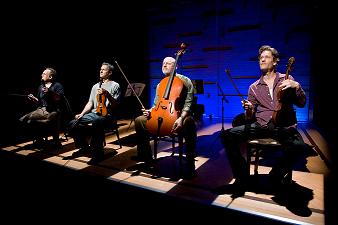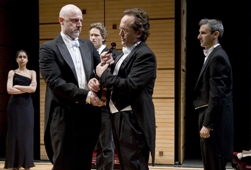 Theater Review: Michael Hollinger’s Opus
Theater Review: Michael Hollinger’s Opus
I find it necessary to articulate that in the world of theater there are many forms, the play being the most obvious form. When it comes up in arts sections of newspapers and magazines, the term “theater” will generally refer to one thing: live theater in the form of the play. Or, plays.
If you’ve been alive at all and had any interest in theater, then you may well know that other forms of theater include musical theater (a close runner up to the play), dance theater (which, in a broad definition would include ballet), opera (as a very specific kind of musical theater), and an entire cast of non-musical/non-dance theater that cannot be crammed into the confines of the play.
To clarify, the play exists within the world of theater as the symphony exists within the world of orchestral music. Back in the mid-19th century, an entire generation of composers (Liszt, the leader among them) proclaimed the death of the symphony. It was the fashion of the time to write symphonic poems, a programmatic orchestral work that eschewed the rigorous formalism of symphonic movement structure. Then along came Brahms, when at the hearty age of forty, he was like, I’m going to write a symphony. And then it was okay to write symphonies again, and still is today.
All this is to say that some art forms outlive their theoretical demise and progress onward throughout history alongside and even overshadowing the newer, precedent-setting work within the genre. What I am attempting to say is that, in an age where so much theater being produced is no longer bound by the formal conventions of the play, the play continues on as a convention of the theater regardless. That being said, Michael Hollinger’s new theater work, Opus, which opened at Primary Stages this past week, looks like a play, walks like a play, smells like a play–nay, it is unabashedly a play.
Why go into all of this? Well, I think it’s important to give context to a review of a dramatic work that is set in formal and stylistic conventions of the play. Just saying whether the play is good or bad would presume too much about our expectations of theater. Is a critic’s role to simply summarize the plot and weigh opinion about tempo and timing? I feel that dance critics in this regard are often more outspoken in critiques of new work than are critics for theater and classical music. There is a sense in dance that new work (this presumably excludes ballet) has an obligation to explore new ground within the genre, and if a new work doesn’t do that, it is usually called out.
If I were to hold Opus up to the same rubric that I would use to critique dance, I would have to say–to paraphrase Alastair Macaulay–there was nothing fresh about the play. From the opening scene the entire tone and pace of the acting jut felt like a play; snappy dialogue that was so rhythmically tight it defied the realistic, unstructured flow of real conversation; the actors playing out to the audience; subtle winks and nods cued through various stresses in their voices to indicate signifiers we’re supposed to add up in our heads to understand the situation; a few jokes thrown in that make us laugh and think oh the writer is certainly on his game.
Now if that is all you want out of the theater, then by all means, Opus, directed by Terrence J. Nolen and starring a cast of able (if unchallenged) play actors (David Beach, Mahira Kakkar, Michael Laurence, Douglas Rees and Richard Topol) is a good play. Hollinger obviously has skill as a writer and is able to make subject of a genre that has probably never been explored to any degree in the theater–the lives of chamber musicians. His facility with the conventions of contemporary play writing (the fast banter, the downstage monologues interspersed between scenes to nuance character, the return of a phrase later in the play gives new context and added meaning to it), but again, there is nothing exceptional about the work, either in its execution or its concept. Instead of really making the life of music making a subject, the narrative devolves into a series of emotional dramas. In this way, chamber music becomes a metaphor; it’s just like any other job and we all still deal with the same array of emotional experiences; loss of love, mental instability, stress, disease. These could be five factory workers, five lawyers, five psychiatrists or five homeless crack addicts. And, because of how they are presented, we’d still feel the same about their relationships.
This is particularly evident in the choice not to have the cast play the instruments. Much deal has been made in the press about how the actors fake playing the music. Well, they don’t fake playing, at all. Instead, they have chosen a stylized way to move that implies playing but cannot at all be called faking playing; their left fingers (the ones that are supposed to move along the strings to create the notes) remain frozen in the air (not moving), while their right arm carefully bows across the strings (which must be covered with something that prevents a sound from being created).
Which, if you’ve heard about the latest productions of Sondheim musicals that require the casts to play all the instruments (Sweeny Tod, Company), it kind of makes you wonder why, for a play that is seemingly supposed to convey the inner realities of string quartet playing, they couldn’t find musicians capable of acting as well. This probably would have taken this play far beyond the boundaries it set for itself, and would have certainly provided a thoroughly more compelling theatrical experience. Think The Monkeys vs The Beatles.
 But this metophorizing of the real actually makes everything unreal. The fact of two of the characters’ (David Beach, Michael Laurence) gay romance (that predictably ends in unhappiness) is a metaphor for love’s frustrations. The cellist’s (Douglas Rees) cancer becomes a metaphor for how fragile life is and why are we bickering over a piece of wood (one of the Lazarus instruments). [And thanks to my friend who attended the show with me for reminding me of Sontag’s work on this subject.] Even the ingenue violinist’s (Kakkar) struggle with a father who disapproves of her choice to become a musician is metaphor for anyone who’s had a disapproving parent.
But this metophorizing of the real actually makes everything unreal. The fact of two of the characters’ (David Beach, Michael Laurence) gay romance (that predictably ends in unhappiness) is a metaphor for love’s frustrations. The cellist’s (Douglas Rees) cancer becomes a metaphor for how fragile life is and why are we bickering over a piece of wood (one of the Lazarus instruments). [And thanks to my friend who attended the show with me for reminding me of Sontag’s work on this subject.] Even the ingenue violinist’s (Kakkar) struggle with a father who disapproves of her choice to become a musician is metaphor for anyone who’s had a disapproving parent.
That seems to be the whole slant here. In a Playbill interview, Hollinger even implies that the play isn’t about music-making, but rather, about life generally. In this sense, the entire play is a metaphor. Which begs the question, Do we need another play that is a metaphor, or do we need theater that actually deals with a real subject? Today, one can’t help but think a documentary (or even a reality TV show–despite the reality that that genre hangs on to our theatrical conventions) would be a wholly more satisfying experience, and would actually impart real knowledge about real lives.
But that might be an easy out. I think it’s possible to do this on stage–impart real knowledge about real lives. But the play as conventional metaphor simply won’t do.
2 Comments
Comments RSS TrackBack Identifier URI

[…] DUmb Critic Hack Awards: The DUCHIES! Today’s DUCHY goes to Linda Winer at Newsday for her review of Opus, which we reviewed the other day. […]
[…] John Heilpern John Heilpern over at The Observer gets props from us today for corroborating our qualms with Opus. He even articulates (did he have a copy of the script?) our citations of […]